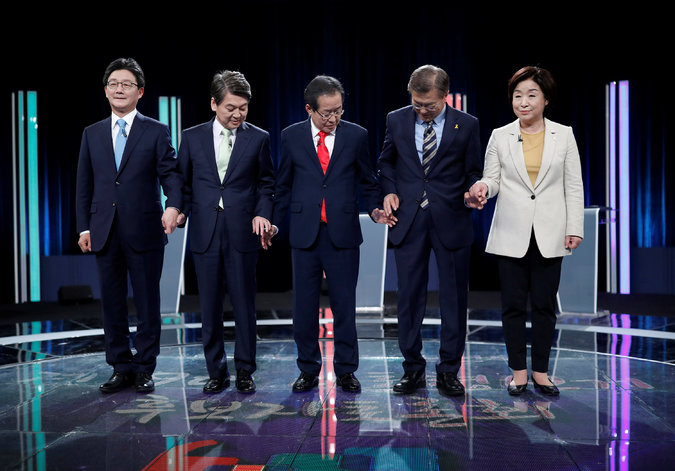Two months after booting their sitting president over corruption allegations, South Koreans will select a new leader Tuesday after weeks of heated debate.
The winner will be tasked with healing a nation that’s split deeply between left and right, and faced with a decaying job market, an uneasy alliance with the United States and a growing threat posed by Democratic People’s Republic of Korea (DPRK)’s nuclear weapons and missiles.
What to know about the vote:
___
SOUTH KOREA LOOKS READY TO GO LIBERAL
With the country’s previous conservative president in jail awaiting trial on corruption charges, the race has become a showdown between two liberal candidates: Moon Jae-in and Ahn Cheol-soo. Moon, a former human rights lawyer and aide to late liberal President Roh Moo-hyun, was the Democratic Party candidate in the last presidential election in 2012 and lost to Park Geun-hye. Ahn, a former doctor and computer software mogul, competed with Moon as an independent to be the single candidate representing liberal camps in 2012, but he dropped out at the last minute. He then joined Moon’s party in 2014 only to leave to form his own party a year later. Ahn is closer to the center than Moon, and has been getting support from some conservatives disappointed by Park but who detest Moon. Still Moon has been leading in opinion surveys for months.
___
ANY OTHER CANDIDATES?
After former U.N. Secretary-General Ban Ki-moon unexpectedly declared he would not run, Hong Joon-pyo became the leading conservative. The candidate for Park’s Liberty Korea Party, however, has suffered politically because of revelations in a 2005 memoir that he assisted a friend in a failed date rape attempt as a teen. Sim Sang-jung, a left-leaning candidate from the minor Justice Party, has struggled to get out of single digits in polls.
___
CAMPAIGN SHOWS NATIONAL DIVIDE
South Korea’s election frenzy is not always noticeable on the streets: There are no bumper stickers, flags, door signs or balloons touting candidates. A strict election law says only registered campaign officials can use material displaying names and photos of candidates or parties with the purpose of promoting them during election periods. Candidates even face restrictions over the size of their name cards. Still, the electorate is deeply divided along ideological and generational lines and also by decades-long regional loyalties. The campaign has grown bitter online, with message boards and social media sites overflowing with testy exchanges between supporters of Moon, Ahn and others.
___
DPRK FRONT AND CENTER
As always, the threat posed by nuclear-armed DPRK has been a major campaign issue. Both Moon and Ahn are critical of the hard line that previous conservative governments took with DPRK over the past decade, arguing the approach did nothing to prevent Pyongyang from speeding up its nuclear weapons and missile development and only diminished Seoul’s influence over its rival. The two have slightly different ideas of what to do next.
___
WHAT MOON WANTS
Moon argues that South Korea should put dialogue over sanctions when dealing with the North and says he is open to talks with its leader Kim Jong Un. He’s vowed to reopen a joint industrial park in a DPRK’s border town that Park’s government closed last year following another nuclear test and rocket launch. Moon has also shown a willingness to challenge ally Washington, saying Seoul should reconsider its plans to deploy an advanced U.S. anti-missile system to cope with DPRK’s threats.
___
AHN DRIFTS TO THE RIGHT
Ahn has been trying to cater to both conservatives who oppose so-called sunshine policies with DPRK, while at the same time trying to win over voters in the important Jeolla region, who traditionally support rapprochement. Ahn says he is willing to negotiate with DPRK “if the conditions are right,” but has also described Kim Jong Un as irrational and unpredictable. Ahn initially opposed the U.S. anti-missile system but later shifted to support it amid deepening anti-DPRK sentiments. He accuses Moon of being too DPRK-friendly.
___
PATH TO VICTORY
In South Korea’s electoral system the winner is the candidate who receives the most votes, even if it is not a majority. There is no runoff. The National Election Commission officials say it’s likely that the winner will be officially declared sometime Wednesday morning after vote counts are finalized. The winner will be sworn in as president immediately after the announcement is made. Recent polls show Moon with a double digit lead over Ahn.
On May 9, voting will be conducted from 6:00 a.m. local time (2100 GMT Monday) to 8:00 p.m. local time (1100 GMT) on Tuesday. Counting will begin right after polls close. The winner of the election is expected to be announced early Wednesday.
Story from the Associated Press with CGTN’s graphic.
 CGTN America
CGTN America







